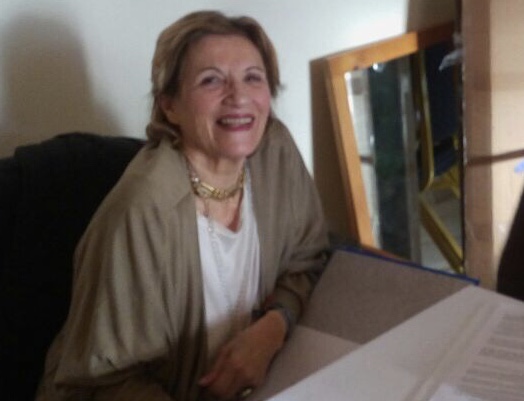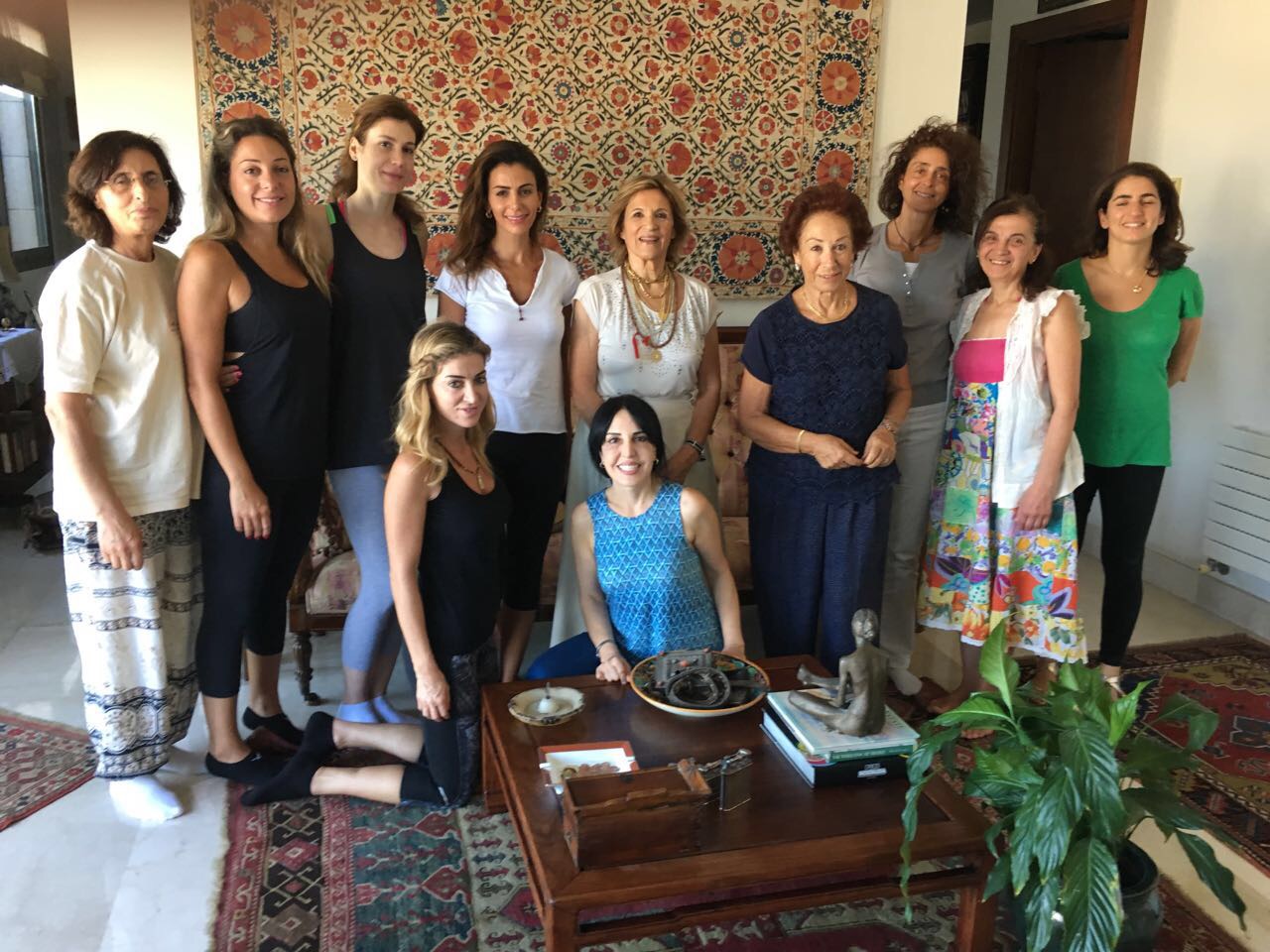Creating Peace in Lebanon: One Woman’s Story

Inner peace is not just something that Susan Hamza talks about—it’s something she lives on a daily basis.
“When I meditate I feel a sense of peace, a total absence of disturbance on the level of emotions, and that carries on throughout the day,” she says. “It’s now a time of my life when very little can disturb my inner peace. It’s a great blessing.”
This statement is even more impressive when you find out that Susan and her family live in Lebanon, a country that has survived a civil war, terrorist attacks, and invasion from neighboring countries in recent decades.
What is Susan’s secret to staying calm in turbulent times? She has been practicing the Transcendental Meditation (TM) technique for 45 years. I recently had the pleasure of interviewing her about her experiences.
Susan laughs when she describes her motivation for starting TM in the first place. “It was 1973 and hippie time, and I was interested in meditation,” she says. “My dream was to go off to Japan and be bidden to enlightenment by a monk in a silk robe!”
Instead, an Austrian TM teacher traveled to Beiruit and gave the first lecture on TM there. Susan remembers, “She spoke about very practical things like lowering stress levels. I looked at my husband and said, ‘This is not what I want.’ But he, being a practical businessman, said, ‘OK, we will start with this and then go further afterwards.’”
They both started TM and never looked back. Within the first three months of practice, Susan felt greater joy, greater bliss, greater peace.
“It gave us everything we ever wanted,” says Susan. “In terms of health, it helped me solve a couple of little problems, but on the level of feeling secure and happy and at ease with myself, there was a big difference. On a spiritual level it opened up big vistas.”
Helping Others to Experience Peace
Susan enjoyed such life-changing benefits that she became a TM teacher in 1985, and has taught over 1000 people to meditate, mostly women. She’s now the head of the TM women’s organization in Lebanon, the Ladies Foundation for Pure Knowledge.
Susan says that when she teaches women to practice Transcendental Meditation, they report the most amazing experiences. “They very soon find that there is more inner stability, that the stress from the outside is not affecting them in the same way. The stress is still there, and they might feel a little bubble of annoyance, but it disappears quite rapidly, they tell me. So many women say, ‘This is what I’ve been searching for, and this is what I want. This has given me the inner harmony and the inner security from which to function.’”
As a mother of two and grandmother of two, Susan feels that TM is especially important for mothers. “As the heart of the family, if the mother is at peace with herself she’s going to bring peace, orderliness, and happiness to her family and all those around her. Because the mother has the role of nourishing and unifying the family and by extension the society. Nourishing others from that basic level of peace is the most powerful aspect of our role as women, I think.”
Susan points out that if the mother is meditating, very soon the children will also want to meditate. “My granddaughter will look up at her mother and say, ‘Mom you haven’t meditated today, go meditate!’ So they know the value of it too.”
Susan points out that our children are the future of the world. “That is how the world is going to become a more peaceful world—if the children are experiencing the peace of the transcendent within,” she says. “Then they can move and act from that level of permanent peace.”
A Spill-Over Effect to Create Peace in the Mideast
While the Transcendental Meditation technique is well known as a way to create inner calm and vanquish anxiety, what is less known is that it can create a “spill-over effect” that contributes to peace for a troubled region. One way this happens is when the number of people practicing the TM technique in a city or region reaches a “tipping point,” positive trends in society take a significant turn for the better.

Fortunately, it doesn’t take everyone in the country to practice TM to create a wave of peace. In fact, research has shown that when a small percentage of a population learns the Transcendental Meditation technique, negative trends such as crime, accidents, hospital admissions, and economic hardship decline within that society. According to research on this effect, in 10 cities where one percent of the population started to practice TM, it created a chain reaction of positivity, as measured in a falling crime rate, less traffic fatalities, higher employment, and an upswing in the economy.
Another, even more efficient way that the TM technique can affect larger populations is when TM meditators join together to practice in groups. While daily practice of the Transcendental Meditation technique alone is life-changing, many people report that their experience of inner silence and inner peace becomes amplified when they join together with other people to meditate in a group. This positive influence then expands to the environment—creating greater positivity, harmony, and even peace in nearby cities or regions.
This can be described as a field effect of consciousness. Just as unified field theory describes the unified field that underlies all matter as a field of infinite correlation, in which particles influence other particles, if enough people start to practice TM and tap into their own experience of inner peace, it will reverberate to create peace and wellbeing in others.
Research on the Field Effect of Consciousness
Believe it or not, there is research on this effect. In fact, Susan herself collected data for a research project that measured the impact of peace-creating groups in Syria, Israel and Cyprus over two years.
“My husband and I had left Beirut and were living in London during the Lebanese Civil War in the early ‘80s,” she says. “I was involved in monitoring the news for statistics on the conflict, which was used in the study.”
This particular study, published in the Journal of Social Behavior and Personality in 1988, with a follow-up study published in 1990, has been described as statistically efficient by the scientists because it was so precise. Every time that critical number of people meditating together was reached, hostilities would diminish, and war deaths dropped by 76 percent. Because the participants in the group were volunteers, at times they would leave for the holidays to see their families, and the numbers of meditators would fall. Then hostilities would increase.
This exact correlation between the number in the group and the number of hostilities went on for two years in a precise manner, as documented in graphs in the published research.
There was another remarkable study of the field effect of consciousness on a small village in Lebanon called Baskinta. This village was caught in the crossfire between the different factions of the Lebanese Civil War for several years. Researchers wanted to see if the field effect of consciousness could stop hostilities in a war zone.
As preparation for the study, two TM teachers began teaching villagers to practice TM in May, 1982. By June they had instructed 100 villagers, which is just one percent of Baskinta’s total population of 10,000.
What happened next was a stunning reversal—a sudden stop to hostilities directed at the village, a situation that lasted throughout the war. This was in stark contrast to what was occurring before that “tipping point” number was reached—and in stark contrast to other villages in the area, which continued to be the target of attacks from both sides. This study shows that the power of just a small percentage of people practicing the TM technique daily can bring peace to a town, a city, a country or region.
Susan believes that the peace-creating effects of the Transcendental Meditation technique provide great hope for the Middle East. “I am convinced that there is no other way to create peace but by having large coherence-creating groups who are practicing Transcendental Meditation and the more advanced TM-Sidhi program. We are working towards that, trying very hard. We just need to make this shift into a new paradigm of thinking about peace.”
For Susan, a woman who has found peace within herself, creating peace and security for her country and the entire Mideast is essential. And she believes it’s the women who can make this happen.
“Women are the unifying force in the home and society,” she says. “As just one example, in Lebanon’s schools, most of the teachers and headmistresses are women. These headmistresses have a sensitivity and openness despite religious differences, and many of them are open to the idea of teaching the children to practice TM and creating peace-creating groups that way.”
Susan believes that we need to go beyond intellectual understanding and mere talking about peace, to teach people to directly experience that most fundamental level of life, which is not only a field of peace but a unified field that unites us all. When enough people experience true inner peace, they will automatically and spontaneously create peace in their surroundings—in a secure manner, with no violence, problems, or negativity.
“It’s essential to create large peace-creating groups here,” she adds. “That is the great goal of life for all TM teachers in the Middle East.”
About the Author
Linda Egenes writes about green and healthy living and is the author of six books, including The Ramayana: A New Retelling of Valmiki’s Ancient Epic—Complete and Comprehensive, co-authored with Kumuda Reddy, M.D.
More Posts by Linda
- Tired and Burned Out? Transcendental Meditation Can Help: An Interview with Dr. Nancy Lonsdorf, MD
- Worried About the Future? Six Ways to Calm Your Anxiety
- What Do You Carry in Your Self-Care Tool Kit?
- Five Strategies for Family Caregivers
- From the Streets to College in Four Months: The Communiversity of South Africa Empowers Underserved Youth in Cape Town





